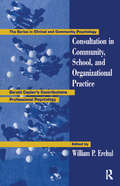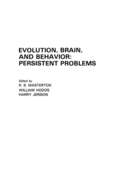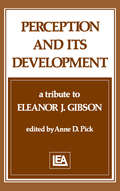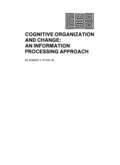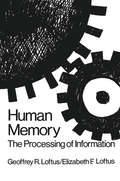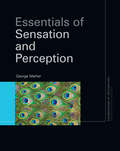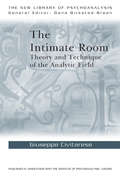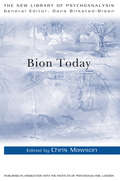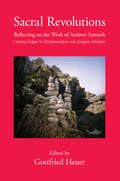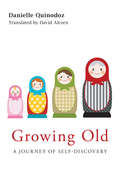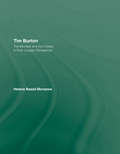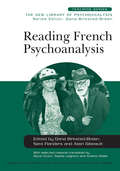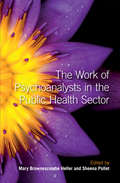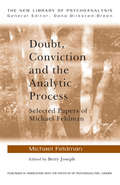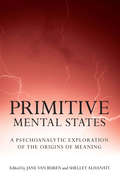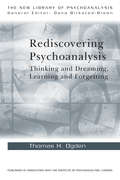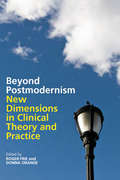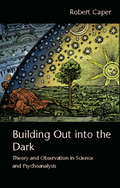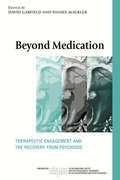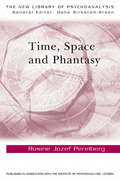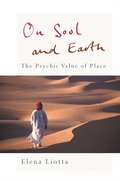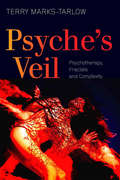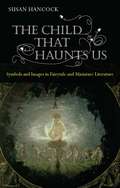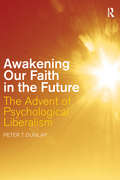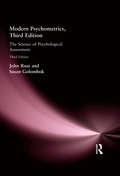- Table View
- List View
Consultation In Community, School, And Organizational Practice: Gerald Caplan's Contributions To Professional Psychology (Clinical and Community Psychology)
by William P. ErchulOffering an historical perspective on the development of mental health consultation and community mental health, this book's intent is twofold. First, it describes and evaluates Harvard psychiatrist Gerald Caplan's innovative approach to consultation and related activities with respect to the current and future practice of clinical community, school and organizational psychology. Second, it pays tribute to Caplan whose ideas on prevention, crisis theory, support systems, community mental health, mental health consultation and collaboration and population-orientated psychiatry have influenced the practice of professional psychology and allied fields.; The text is divided into three sections: the first provides background information for the remainder of the volume; the second documents Caplan's influence on the way psychology has been applied in various settings; andthe last considers his contribution's present and past influence. The text is aimed at consultant and practising psychologists, community and school psychology graduates and professionals involved with community mental health services.
Evolution, Brain, and Behavior: Persistent Problems
by R. B. MASTERTON, WILLIAM HODOS AND HARRY JERISONIn this second volume on the evolution of the nervous system and behavior, the discussion turns from conclusions to method, from a desciption of what happened in history to the means of deciidng what happened. First published in 1976.
Perception and Its Development: A Tribute To Eleanor J. Gibson
by Anne D. PickWe have acquired important new knowledge about the nature and development of perception in recent years, and the insights of Eleanor Jack Gibson have had a prominent role in guiding the search for that knowledge. The purpose of this volume is to honor her continuing conrbution to our understanding of perception. First published in 1979. Routledge is an imprint of Taylor & Francis, an informa company.
Cognitive Organization and Change: An Information-processing Approach (Complex Human Behavior Ser.)
by R. S. Wyer, Jr.This book grew out of a graduate course in cognitive organization and change that the author taught during his tenure at the University of Illinois at Chicago Circle. Two primary objectives of the course are reflected in this book: first, to provide a general conceptual framework for critically and systematically analyzing research and theory on attitude and opinion change; second, to stimulate research on fundamental problems, related to these phenomena, that are made salient as a result of this analysis. First published in 1974. Routledge is an imprint of Taylor & Francis, an informa company.
Human Memory: The Processing of Information
by Geoffrey R. Loftus Elizabeth F. LoftusOver the past 20 years, the study of human memory has become an increasingly popular topic of study for psychologists, and since the late 1960s a new framework for studying memory has begun to take shape. It is the purpose of this book to present a broad overview of this framework, including descriptions of (1) the major theoretical components of the framework and (2) the critical research findings that justify the establishment of these components and illuminate the mechanisms by which they operate. The book is not meant to constitute an exhaustive review of the enormous research literature that has accrued over the years. The authors deliberately avoid wading into masses of detail on any given topic area, and we deliberately sidestep a number of current theoretical controversies. Instead, this book has been planned to be a guide and an introduction for the student or interested layman with little or no background in the area of memory as a field of psychological inquiry.
Essentials of Sensation and Perception (Foundations of Psychology)
by George MatherThe study of sensation and perception looks at how we acquire, process, and interpret information about the outside world. By describing key ideas from first principles, this straightforward introduction provides easy access to the basic concepts in the subject, and incorporates the most recent advances with useful historical background. The text takes a uniquely integrative approach, highlighting fundamental findings that apply across all the senses - including vision, hearing, touch, pain, balance, smell and taste - rather than considering each sense in isolation. Several pedagogical features help students to engage with the material. ‘Key Term’ and ‘Key Concept’ boxes describe technical terms and concepts whilst ‘Question’ boxes relate the material to everyday questions about perception. Each chapter ends with suggestions for further reading, and the final chapter draws together the material from the previous chapters, summarizing the broad principles described, and outlining some major unresolved issues. Assuming no prior knowledge, this book is an accessible and up-to-date overview of the processes of human sensation and perception. Presented in full color, it is an ideal introduction for pre-undergraduate and first year undergraduate students on courses in psychology, as well as neuroscience and biology.
The Intimate Room: Theory and Technique of the Analytic Field (New Library of Psychoanalysis)
by Giuseppe CivitareseThe Intimate Room provides an original exploration of psychoanalytic thought, showing how contemporary psychoanalysis seeks to answer the challenges raised by today’s post-modern culture. Offering a deeply personal and insightful reading of Bion, this book acts as a stimulating guide to the development of the theory of the analytic field and both its technical and clinical implications. As such topics of discussion include: the concept of the internal setting the rhetoric of interpretation the 'subversive' notion of Nachträglichkeit the role played by characters in analytic discourse the bi-personal field as virtual reality new concepts of transference. Allowing the reader to engage with the inner space of analysis, The Intimate Room will be of interest to psychoanalysts, psychotherapists and all those with an interest in the field of psychoanalysis. It will also be a useful tool in psychoanalytic and psychotherapeutic work on a day-to-day basis.
Bion Today: Bion Today (The New Library of Psychoanalysis)
by Chris MawsonBion Today explores how Bion’s work is used in contemporary settings; how his ideas have been applied at the level of the individual, the group and the organisation; and which phenomena have been made more comprehensible through the lenses of his concepts. The book introduces distinctive psychoanalytic contributions to show the ways in which distinguished analysts have explored and developed the ideas of Wilfred Bion. Drawing on the contributors’ experience of using Bion’s ideas in clinical work, topics include: an introduction to Bion clarification of the inter-related concepts of countertransference and enactment concepts integrating group and individual phenomena clinical implications of Bion’s thought Bion’s approach to psychoanalysis. Bion Today will be a valuable resource for psychoanalysts, psychotherapists and all those who are interested in learning more about Bion’s thinking and his work.
Sacral Revolutions: Reflecting on the Work of Andrew Samuels – Cutting Edges in Psychoanalysis and Jungian Analysis
by Gottfried HeuerSacral Revolutions is a unique project reflecting the contribution that Andrew Samuels has made to the general field of psychoanalysis and Jungian analysis in both clinical and academic contexts. Gottfried Heuer has brought together an international array of authors – friends and colleagues of Samuels – to honour his 60th Birthday. As a result, the collection provides a creative and cutting-edge overview of a fragmented field. The chapters demonstrate the profound sense of social responsibility of these analysts and academics whose concerns include the mysteries and hidden meanings in social and political life. This open and engaging volume includes a previously unpublished interview with C. G. Jung, adding to its usefulness as an essential companion for academics, analysts, therapists and students.
Growing Old: A Journey of Self-Discovery
by Danielle QuinodozPeople react very differently to the process of ageing. Some people shy away from old age for as long as they can and eventually spend it reflecting on times when they were physically and mentally stronger and more independent. For others old age is embraced as a new adventure and something to look forward to. In this book psychoanalyst Danielle Quinodoz highlights the value of old age and the fact that although many elderly people have suffered losses, either of their own good health or through bereavement, most have managed to retain the most important thing – their sense of self. Quinodoz argues that growing old provides us with the opportunity to learn more about ourselves and instead of facing it with dread, it should be celebrated. Divided into accessible chapters this book covers topics including: the internal life-history remembering phases of life anxiety about death being a psychoanalyst and growing old. Throughout Growing Old the author draws on both her clinical experience of working with the elderly, and her own personal experience of growing old. This makes it an interesting read for both practising psychoanalysts, and those who wish to gain a greater insight of the natural progression into later life.
Tim Burton: A Post-Jungian Perspective
by Helena Bassil-MorozowTim Burton’s films are well known for being complex and emotionally powerful. In this book, Helena Bassil-Morozow employs Jungian and post-Jungian concepts of unconscious mental processes along with film semiotics, analysis of narrative devices and cinematic history, to explore the reworking of myth and fairytale in Burton’s gothic fantasy world. The book explores the idea that Burton’s lonely, rebellious ‘monstrous’ protagonists roam the earth because they are unable to fit into the normalising tendencies of society and become part of ‘the crowd’. Divided into six chapters the book considers the concept of the archetype in various settings focusing on: the child the monster the superhero the genius the maniac the monstrous society. Tim Burton: The Monster and the Crowd offers an entirely fresh perspective on Tim Burton’s works. The book is essential reading for students and scholars of film or Jungian psychology, as well as anyone interested in critical issues in contemporary culture. It will also be of great help to those fans of Tim Burton who have been searching for a profound academic analysis of his works.
Reading French Psychoanalysis (New Library of Psychoanalysis Teaching Series)
by David Alcorn Alain Gibeault Dana Birksted—Breen Sara Flanders Sophie Leighton Andrew WellerHow has psychoanalysis developed in France in the years since Lacan so dramatically polarized the field? In this book, Dana Birksted-Breen and Sara Flanders of the British Psychoanalytical Society, and Alain Gibeault of the Paris Psychoanalytical Society provide an overview of how French psychoanalysis has developed since Lacan. Focusing primarily on the work of psychoanalysts from the French Psychoanalytical Association and from the Paris Psychoanalytical Society, the two British psychoanalysts view the evolution of theory as it appears to them from the outside, while the French psychoanalyst explains and elaborates from inside the French psychoanalytic discourse. Seminal and representative papers have been chosen to illuminate what is special about French thinking. A substantial general introduction argues in favour of the specificity of 'French psychoanalysis', tracing its early influences and highlighting specific contemporary developments. Sections are made up of introductory material by Alain Gibeault, followed by illustrative papers in the following categories: the history of psychoanalysis in France the pioneers and their legacy the setting and the process of psychoanalysis phantasy and representation the body and the drives masculine and feminine sexuality psychosis. An excellent introduction to French psychoanalytical debate, Reading French Psychoanalysis sheds a complementary light on thinking that has evolved differently in England and North America. It will be ideal reading for beginners and advanced students of clinical theory as well as experienced psychoanalysts wanting to know more about French Psychoanalytic theory, and how it has developed.
The Work of Psychoanalysts in the Public Health Sector
by Sheena Pollet Mary HellerThis book provides a comprehensive insight into the ways in which psychoanalysts think and work. Mary Brownescombe Heller and Sheena Pollet bring together internationally known contributors trained at the Institute of Psychoanalysis to explore the broad range of clinical work, thinking, and teaching undertaken with children, families, adults and staff by psychoanalysts in the UK public health sector. Divided into four sections, The Work of Psychoanalysts in the Public Health Sector covers: clinical work with parents and young children, clinical work with adults and their families, analytic thinking in health service practice analytic support for health service staff. Experienced psychoanalysts discuss work with various client groups including parents with babies, children, adolescents who self harm, and adults with serious mental health conditions and psychosis. The book also explores how psychoanalytically-informed work can be used alongside other treatment methods, and how health service staff can best be trained and supported. The Work of Psychoanalysts in the Public Health Sector offers the reader a broad perspective and a clear understanding of the various analytical concepts used in clinical practice. It will be invaluable reading for anyone interested in, or already using psychoanalytic ideas and techniques in the health sector, as well as students in training.
Doubt, Conviction and the Analytic Process: Selected Papers of Michael Feldman (The New Library of Psychoanalysis)
by Michael FeldmanIn this profound and subtle study, a practising psychoanalyst explores the dynamics of the interaction between the patient and the analyst. Michael Feldman draws the reader into experiencing how the clinical interaction unfolds within a session. In doing so, he develops some of the implications of the important pioneering work of such analysts as Klein, Rosenfeld and Joseph, showing in fine detail some of the ways in which the patient feels driven to communicate to the analyst, not only in order to be understood by him, but also in order to affect him. The author's detailed descriptions of the clinical process allow the reader to follow the actual process that enables the patient to get into contact with thoughts and feelings of which he or she was previously unconscious or only vaguely aware. Feldman makes the reader aware of the constant dynamic interaction between the patient and the analyst, each affecting the other. He shows how the analyst has to find a balance between doubt, uncertainty and confusion in himself and through this process may arrive at an understanding of what is happening, and by formulating this understanding the analyst can make a significant contribution to the process of psychic change. This collection of essays not only throws light on fascinating questions of technique, but also reflects on elements that are fundamental to psychoanalytic work. It is essential reading for practising psychoanalysts and those in training, as well as anyone with a general interest in the psychoanalytic relationship between the client and the therapist in the consulting room.
Primitive Mental States: A Psychoanalytic Exploration of the Origins of Meaning (Primitive Mental States Ser. #Vol. I)
by Jane Van Buren Shelley AlhanatiTraditional psychoanalysis relies on the presence of certain meaning-making capacities in the patient for its effectiveness. Primitive Mental States examines how particular capacities including those for symbolising, fantasising, dreaming, experiencing and finding meanings in those experiences, can be taken for granted. Many of us lack these capacities in certain dimensions of our minds making traditional psychoanalysis ineffective. In this book, international contributors are brought together to consider a radical evolution in contemporary psychoanalytic theory developed from a combination of ultrasound studies, infant analysis, and observation of mothers and babies. These findings demonstrate how much mental life exists even before birth and considers unevolved, unborn and barely born aspects of the self such as the birth of emotion and the birth of alpha functioning. Topics covered include: prenatal imprints on the mind and body difficult to treat patients non-verbal, non-symbolic, disembodied states of being early relational and attachment trauma. Illustrated throughout with original data and extensive clinical discussions from some of the biggest names in the field, Primitive Mental States will be a useful resource for students and seasoned analysts alike.
Rediscovering Psychoanalysis: Thinking and Dreaming, Learning and Forgetting (The New Library of Psychoanalysis)
by Thomas H. OgdenWinner of the 2010 Haskell Norman Prize for Outstanding Achievement in Psychoanalysis! Rediscovering Psychoanalysis demonstrates how, by attending to one’s own idiosyncratic ways of thinking, feeling, and responding to patients, the psychoanalyst can develop a "style" of his or her own, a way of practicing that is a living process originating, to a large degree, from the personality and experience of the analyst. This book approaches rediscovering psychoanalysis from four vantage points derived from the author’s experience as a clinician, a supervisor, a teacher, and a reader of psychoanalysis. Thomas Ogden begins by presenting his experience of creating psychoanalysis freshly in the form of "talking-as-dreaming" in the analytic session; this is followed by an exploration of supervising and teaching psychoanalysis in a way that is distinctly one’s own and unique to each supervisee and seminar group. Ogden goes on to rediscover psychoanalysis in this book as he continues his series of close readings of seminal analytic works. Here, he makes original theoretical contributions through the exploration, explication, and extension of the work of Bion, Loewald, and Searles. Throughout this text, Thomas Ogden offers ways of revitalizing and reinventing the exchange between analyst and patient in each session, making this book essential reading for psychoanalysts, psychotherapists, and other readers with an interest in psychoanalysis.
Beyond Postmodernism: New Dimensions in Clinical Theory and Practice
by Donna Orange Roger FrieBeyond Postmodernism identifies ways in which psychoanalysis has moved beyond the postmodern debate and discusses how this can be applied to contemporary practice. Roger Frie and Donna Orange bring together many of the leading authorities on psychoanalytic theory and practice to provide a broad scope of psychoanalytic viewpoints and perspectives on the growing interdisciplinary discourse between psychoanalysis, continental philosophy, social theory and philosophy of mind. Divided into two parts, Psychoanalytic Encounters with Postmodernism and Psychoanalysis Beyond Postmodernism, this book: elaborates and clarifies aspects of the postmodern turn in psychoanalysis furthers an interdisciplinary perspective on clinical theory and practice contributes to new understandings of theory and practice beyond postmodernism. Beyond Postmodernism: New Dimensions in Clinical Theory and Practice provides a fresh perspective on the relationship between psychoanalysis and postmodernism and raises new issues for the future. It will be of interest to practicing psychoanalysts and psychologists as well as students interested in psychoanalysis, postmodernism and philosophy.
Building Out into the Dark: Theory and Observation in Science and Psychoanalysis
by Robert CaperIn this book, Robert Caper provides the reader with an introduction to psychoanalysis focusing explicitly on whether psychoanalysis is part of the sciences, and if not, where it belongs. Many psychoanalysts, beginning with Freud, have considered their discipline a science. In this book, Caper examines this claim and investigates the relationship of theory to observation in both philosophy and the experimental sciences and explores how these observations differ from those made in psychoanalytic interpretation. Building Out into the Dark also explores topics including: the origins of psychoanalysis in the art of medicine the therapeutic effect of psychoanalysis the archaic superego psychoanalysis with the individual and groups what makes psychoanalytic work unique. Building Out into the Dark offers a thoughtful consideration of the nature of psychoanalytic knowledge and how it is gained. The book's accessible and concise style makes it a useful introductory resource for students studying psychoanalysis, for psychotherapists who are curious about the distinction between psychoanalysis and other forms of therapy as well as those interested in placing psychoanalysis in the context of current cultural and intellectual developments.
Beyond Medication: Therapeutic Engagement and the Recovery from Psychosis (The International Society for Psychological and Social Approaches to Psychosis Book Series)
by David Garfield Daniel MacklerBeyond Medication focuses on the creation and evolution of the therapeutic relationship as the agent of change in the recovery from psychosis. Organized from the clinician’s point of view, this practical guidebook moves directly into the heart of the therapeutic process with a sequence of chapters that outline the progressive steps of engagement necessary to recovery. Both the editors and contributors challenge the established medical model by placing the therapeutic relationship at the centre of the treatment process, thus supplanting medication as the single most important element in recovery. Divided into three parts, topics of focus include: Strengthening the patient The mechanism of therapeutic change Sustaining the therapeutic approach. This book will be essential reading for all mental health professionals working with psychosis including psychoanalysts, psychiatrists, psychologists and social workers.
Time, Space and Phantasy (The New Library of Psychoanalysis)
by Rosine Jozef PerelbergTime, Space, and Phantasy examines the connections between time, space, phantasy and sexuality in clinical practice. It explores the subtleties of the encounter between patient and analyst, addressing how aspects of the patient’s unconscious past are actualised in the present, producing new meanings that can be re-translated to the past. Perelberg’s analysis of Freud’s Multi-dimensional model of temporality suggests that he always viewed the constitution of the individual as non-linear. In Freud’s formulations, the individual is decentred and ruled by different temporalities, most of which escape their consciousness. Perelberg identifies the similarities between this and Einstein’s theory of relativity which states that rather than being absolute, time depends on the relative position and speed of the observing individual suggesting that rather than being a reality, time is an abstraction, connecting objects and events. Throughout this text, Perelberg draws together connections between time, mental space, and phantasy showing how time is constantly reshaped in the light of new events and experiences. This book will be of interest to psychoanalysts, psychotherapists, psychologists, and social workers.
On Soul and Earth: The Psychic Value of Place
by Elena LiottaOn Soul and Earth offers an original perspective on the relationship between the environment and the human psyche. Physical spaces contribute to the building of identity through personal experience and memory. Places evoke emotions and carry their own special meanings. Elena Liotta and her contributors also explore the neglected topics of migration and travel. The author has extensive clinical experience of working with patients from a wide variety of national and cultural backgrounds. Globalization is present in the clinical office as well as in the wider world and the transformations currently being wrought in the areas of cultural and national identity also impact on clinical work. This book will be of interest to Jungian analysts as well as psychotherapists and mental health professionals, especially those who are addressing transcultural and multicultural issues including voluntary or enforced migration. It will also appeal to urban planners, architects and those interested in environmental issues.
Psyche's Veil: Psychotherapy, Fractals and Complexity
by Terry Marks-TarlowHistorically, the language and concepts within clinical theory have been steeped in linear assumptions and reductionist thinking. Because the essence of psychotherapy involves change, Psyche’s Veil suggests that clinical practice is inherently a nonlinear affair. In this book Terry Marks-Tarlow provides therapists with new language, models and metaphors to narrow the divide between theory and practice, while bridging the gap between psychology and the sciences. By applying contemporary perspectives of chaos theory, complexity theory and fractal geometry to clinical practice, the author discards traditional conceptions of health based on ideals of regularity, set points and normative statistics in favour of models that emphasize unique moments, variability, and irregularity. Psyche’s Veil further explores philosophical and spiritual implications of contemporary science for psychotherapy. Written at the interface between artistic, scientific and spiritual aspects of therapy, Psyche’s Veil is a case-based book that aspires to a paradigm shift in how practitioners conceptualize critical ingredients for internal healing. Novel treatment of sophisticated psychoanalytical issues and tie-ins to interpersonal neurobiology make this book appeal to both the specialist practitioner, as well as the generalist reader. .
The Child That Haunts Us: Symbols and Images in Fairytale and Miniature Literature
by Susan HancockThe Child That Haunts Us focuses on the symbolic use of the child archetype through the exploration of miniature characters from the realms of children’s literature. Jung argued that the child archetype should never be mistaken for the ‘real’ child. In this book Susan Hancock considers how the child is portrayed in literature and fairytale and explores the suggestion from Jung and Bachelard that the symbolic resonance of the miniature is inversely proportionate to its size. We encounter many instances where the miniature characters are a visibly vulnerable ‘other’, yet often these occur in association with images of the supernatural, as the desired or feared object of adult imagination. In The Child That Haunts Us it is emphasised that the treatment by any society, past or present, of its smallest and most vulnerable members is truly revealing of the values it really holds. This original and sensitive exploration will be of particular interest to undergraduate and postgraduate students as well as academics engaged in Jungian studies, children’s literature, childhood studies and those with an interest in socio-cultural constructions of childhood.
Awakening our Faith in the Future: The Advent of Psychological Liberalism
by Peter T. DunlapWhat transformation would happen if we could combine the best of liberal politics with psychology? Awakening our Faith in the Future investigates the avenues for creating a new branch of psychology, a transformative political psychology. In the past, political psychology has focused directly on analysis and knowledge acquisition, rather than on interventions that transform self and culture. A transformative political psychology combines the best of traditional social science with the transformative intent of clinical psychology in order to create a new political culture. Peter T. Dunlap suggests that while liberals focus intently outside of themselves on changing the world, those with psychological interests focus much more internally on changing themselves. In this book, he argues that by combining political liberalism and psychology, and encouraging psychologists to develop cultural learning practices based on ideas of self-knowledge, there is opportunity to transform our political culture. Divided into five parts, this book explores: stories of political destiny questions of development opportunities for political development a speculative theory of cultural evolution practices of a political psychologist. This scholarly text uses personal experiences and the stories of progressive political leaders as pathways for addressing political problems, making it ideal reading for professionals and students in the fields of both politics and psychology as well as for activists interested in the future of liberalism.
Modern Psychometrics: The Science of Psychological Assessment (3rd Edition)
by John Rust Susan GolombokToday psychometrics plays an increasingly important role in all our lives as testing and assessment occurs from preschool until retirement. This book introduces the reader to the subject in all its aspects, ranging from its early history, school examinations, how to construct your own test, controversies about IQ and recent developments in testing on the internet. In Part one of Modern Psychometrics, Rust and Golombok outline the history of the field and discuss central theoretical issues such as IQ, personality and integrity testing and the impact of computer technology and the internet. In Part two a practical step-by-step guide to the development of a psychometric test is provided. This will enable anyone wishing to develop their own test to plan, design, construct and validate it to a professional standard. This third edition has been extensively updated and expanded to take into account recent developments in the field, making it the ideal companion for those studying for the British Psychological Society’s Certificates of Competence in Testing. Modern Psychometrics combines an up to date scientific approach to the subject with a full consideration of the political and ethical issues involved in the large scale implementation of psychometrics testing in today’s highly networked society, particularly in terms of issues of diversity and internationalism. It will be useful to students and practictioners at all levels who are interested in psychometrics.
